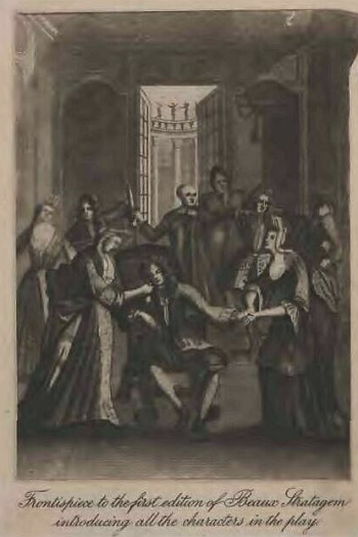The Play
"Come, come, we are the men of intrinsic value, who can strike our fortunes out of ourselves, whose worth is independent of accidents in life, or revolutions in government: we have heads to get money and hearts to spend it."
-Archer, Act One-
Written and first produced in 1707, The Beaux' Stratagem stood as George Farquhar's final play; according to numerous critics since, it is also his finest.
BRIEF SUMMARY
Posing as a well-to-do gentleman and his manservant, Aimwell and Archer—two recently impoverished rakes—take the town of Lichfield by storm, seeking to secure wealthy women as wives and so refill their own coffers. While Aimwell sets his sights on eminently eligible bachelorette Dorinda, Archer angles toward her sister-in-law, the most unhappily married Mrs. Sullen. Gaining the interest of their respective targets and access to the house in which the ladies reside, Aimwell and Archer set out to take hold of the ladies’ wealth before they can be exposed either by a suspicious innkeeper and his band of highwaymen or by an acquaintance privy to their true identity. The ensuing action creates a wild whirl of schemes, revealing amorous declarations and practical plots that propel the play to its seemingly (if somewhat questionably) happy end, in which the truth comes out, Aimwell and Dorinda accept each other, Mr. and Mrs. Sullen resolve to split, and Archer secures a fortune of his own.
For a fuller account of the play, see the scene-by-scene synopsis.
CHARACTERS
Aimwell two gentlemen of broken fortunes, the first as master,
Archer and the second as servant
Count Bellair a French officer, prisoner at Litchfield
Sullen a country blockhead, brutal to his wife
Freeman a gentleman from London
Foigard a priest, chaplain to the French officers
Gibbet a high-way-man
Houslow his companions
Bagshot
Boniface landlord of the inn
Scrub servant to Mr. Sullen
Archer and the second as servant
Count Bellair a French officer, prisoner at Litchfield
Sullen a country blockhead, brutal to his wife
Freeman a gentleman from London
Foigard a priest, chaplain to the French officers
Gibbet a high-way-man
Houslow his companions
Bagshot
Boniface landlord of the inn
Scrub servant to Mr. Sullen
Lady Bountiful an old civil country gentlewoman, that cures all
her neighbours of all distempers, and foolishly
fond of her son Sullen
Dorinda Lady Bountiful's daughter
Mrs. Sullen her daughter-in-law
Gipsy maid to the ladies
Cherry the landlord's daughter in the inn
her neighbours of all distempers, and foolishly
fond of her son Sullen
Dorinda Lady Bountiful's daughter
Mrs. Sullen her daughter-in-law
Gipsy maid to the ladies
Cherry the landlord's daughter in the inn
(Character list and descriptions as listed in the 1707 printing of the play; the New Mermaids edition also lists Chamberlain, Tapster, Fellow, Travellers, and Country Woman.)
SETTING
I.i: An inn.
II.i: A gallery in Lady Bountiful's house.
II.ii: The inn.
III.i: Lady Bountiful's house.
III.ii: The inn.
III.iii: A gallery in Lady Bountiful's house.
IV.i: (A gallery in) Lady Bountiful's house.
V.i: The inn.
V.ii: A bed-chamber in Lady Bountiful's house.
V.iii: Another apartment in Lady Bountiful's house.
V.iv: A gallery in Lady Bountiful's house.
The whole of the play occurs in Lichfield.
II.i: A gallery in Lady Bountiful's house.
II.ii: The inn.
III.i: Lady Bountiful's house.
III.ii: The inn.
III.iii: A gallery in Lady Bountiful's house.
IV.i: (A gallery in) Lady Bountiful's house.
V.i: The inn.
V.ii: A bed-chamber in Lady Bountiful's house.
V.iii: Another apartment in Lady Bountiful's house.
V.iv: A gallery in Lady Bountiful's house.
The whole of the play occurs in Lichfield.
ON-SITE RESOURCES
Synopsis: A scene-by-scene overview of the play.
Quotes from the Play: A smattering of quotes offering a sense of the play's tone and varied characters.
Remarks on the Play: Words from critics throughout the play's production history.
The Wilder-Ludwig Adaptation: This most marked adaptation of The Beaux' Stratagem began with the tinkering of Thornton Wilder and reached completion over sixty years later, in the hands of Ken Ludwig.
PLAY TEXTS AVAILABLE ONLINE
1752 publication; available via Google Books. As acted at the Theatre Royal. Includes an epilogue by "Mr. Smith, the Author of Phaedra and Hippolytus," as well as "Song of a Trifle" text.
1898 edition, edited by H. Macaulay Fitzgibbon; available via Project Gutenberg (also through Google Books). Includes an introduction to the author and play, and comes accompanied by footnotes. Also includes frontispiece to first edition of the play.
1914 edition, edited by Louis A. Strauss; available via Google Books. This collection also includes Farquhar's Recruiting Officer and "Discourse Upon Comedy," as well as a fairly substantial biography of Farquhar and contextualizing introduction.

